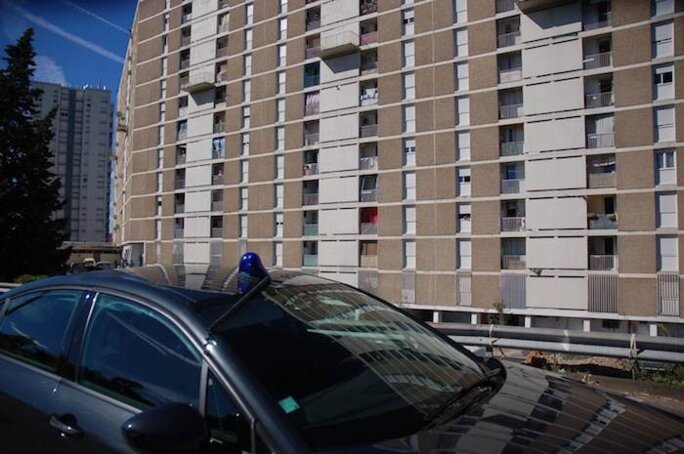
Enlargement : Illustration 1

High summer may traditionally be a quiet time for French politicians, but that has certainly not been the case this year with interior minister Manuel Valls. The tough-talking head of the country's security apparatus has kept a relentlessly high media profile, hammering home his message that the government has to be hard on criminals, especially repeat offenders and drug dealers.
This public visibility has continued despite Valls sparking a major row with his colleague, justice minister Christiane Taubira, over her plans to reform the criminal justice system, notably on the issue of minimum jail terms for repeat offenders. On Tuesday morning he took part in a interview and phone-in on BFM TV and RMC radio before heading off to Marseille with other ministers and prime minister Jean-Marc Ayrault in the wake of the 13th drugs or gang-related fatal shooting in that city since the start of the year.
The row with Taubira came after Valls wrote to President François Hollande on July 25th setting out in forthright terms his opposition to her criminal law reforms – which have already been delayed – and asking the head of state to intervene personally to rule on the proposed changes. Last week that letter was leaked to Le Monde, prompting a damaging public row for the government. Taubira made clear her irritation over both the content of the letter and the fact that she had not been informed of it, while Valls himself was quick to attack the leak.
“I regret that a note sent to the president of the Republic and the prime minister has been published in the press,” he declared. “A government needs to be able to work in discretion and in secret.” Valls also denied that he was taking part in the perennial turf war in French politics between interior ministers – responsible for law and order and security – and justice ministers who are in charge of the legal system, the prisons and the courts. “There's no question of indulging in that role playing that the Republic has known only too well,” he insisted. Valls also conceded – some would say belatedly – that “the criminal law is not drawn up at the ministry of the interior but at the ministry of justice”.
It is true that Valls and Taubira – the former from the right of the Socialist Party, the latter from the left – have not stinted in their efforts to appear united in the 18 months since President Hollande came to power. They have made a number of joint official visits together, outdoing each other in their efforts to show their friendliness, for example in November 2012 at the national congress of the judges' official body the Union syndicale des magistrats at Colmar in north east France and at a meeting in May this year at Lyon to assess the impact of the government’s new law and order priority areas. It took the much-delayed reforms of the criminal law to bring their disagreements into the open.

Enlargement : Illustration 2

The first public hitch came on August 5th when the right-wing newspaper Le Figaro expressed its outrage over a decision by the prosecution authorities in Chartres, south west of Paris, to defer the imprisonment of three convicted criminals – for two or three months – because of overcrowding in the country's prisons. Rather than come to the support of his ministerial colleague at the justice ministry, which is responsible for sentencing policy, Valls once again showed a desire not to appear soft on criminals, saying he was “very surprised” and “worried” by the decision. According to Le Figaro, the interior minister even took the trouble to call the police commander who had written a report on the issue which had been sent to police headquarters and to the right-leaning police trade union Synergie Officiers, and which had also been leaked to the newspaper.
'There's no end to it'

Enlargement : Illustration 3

In his July letter to the president about the criminal justice reforms, Valls underlined that “nearly every measure” of Christiane Taubira's reforms “were the object of discussion, even the opposition of the ministry of the interior”. Calling for President Hollande to intervene personally, he added: “The gap between our two analyses remains too great.” For even though Valls said he backed the principle of having judicial discretion over sentencing – one of the president’s 60 pledges in his election campaign – he believes that prison overcrowding cannot simply be explained by the minimum term sentences introduced in 2007 for repeat offenders.
Valls instead referred to “the question of the scale of the prison facilities”, in other words suggesting the need to build new prisons. In his letter the interior minister then wrote of “a greater requirement for predictability and toughness” in the treatment of repeat offenders. So having effectively buried Hollande's election promise to end controversial police stop and searches of people based on their physical appearance, the interior minister seems now to have little hesitation in casting doubt on another pledge, that of ending minimum sentences. Yet the situation in French prisons has become explosive with a new record population as of July 1st 2013 of 68,569 people in jail, when in theory there are places for just 57,320.
During a well-publicised earlier visit to Marseille last week to review progress in the fight against the drugs trade, Valls declined to outline his counter-proposals for reducing the prison population. Instead, as he visited the Oliviers housing estate in the north of the Mediterranean city, the interior minister returned to his theme of the need for toughness against both repeat offenders and drug dealers. “The French people demand toughness,” he said. “It's up to the Left to put in place a particularly tough policy with regard to those who attack the authority of the state, for the principal victims of such acts are the residents of poorer areas.” He was also critical of calls to de-criminalise cannabis, saying the debate was “often a mockery” and he emphasised the health risks of the drug. “Yes, cannabis is destructive and, yes, society needs to have bans and points of reference,” he added.
The minister also displayed the same tough message when praising the impact of creating 15 law and order priority zones in Marseille in August 2012. According to him, local police figures all show a fall in the level of crime in those areas in the first six months of 2013 compared with the same period in 2012. Yet in the past Valls himself has criticised the lack of reliability and the manipulation of such figures.
The demand for tougher action against criminals is a familiar refrain. It has been used by the Right for the last ten years and its clear failure led the Socialist Party to rethink its entire law and order policy. For example, according to a study carried out by the prison authorities, 59% of people who left prison in 2002 were re-convicted of offences in the following five years. And the increased length in prison sentence, following the introduction of minimum terms, has not led to a corresponding fall in repeat offending. On the contrary, between 2006 and 2010 the rate of re-offending rose from 3.9% to 6% for major crimes and from 7% to 11.1% for less serious offences.
As for the effectiveness of French criminal policy on cannabis, which is one of the toughest in Europe, figures from the European Monitoring Centre for Drugs and Drug Addiction (EMCDDA) speak for themselves: “Between 2007 and 2011 the declared usage of cannabis of young French people (girls and well as boys) rose strongly over the months from 15% to 24%.” In Marseille last week the interior minister himself admitted that France now has “the sad privilege of being in the vanguard of European Union countries when it comes to cannabis consumption”. He added that the percentage of drug dealers who were juveniles went from under 10% in 2008 to 14.5% by the end of 2012. In Marseille, Valls said, juveniles now represent “more than a third of dealers who are questioned”.
As a member of the police prefecture – the police authority – in Marseille put it: “We clamp down regularly but there's no end to it.”
Valls's tough stance has meanwhile earned him a rebuke from radical-left politician Jean-Luc Mélenchon, co-founder of the Parti de Gauche, who has accused the interior minister of being “contaminated” by the leader of the far-right Front national Marine Le Pen.
Twisting the figures...
In her response to Valls's letter to the president, Christiane Taubira criticised the “erroneous” figures used by the interior minister and the “tendentious presentation” of the “profiles of criminals that would lead systemically to terms of imprisonment”.
For, in order to underscore the significant presence of multi-offenders among those convicted in France, Valls's letter claimed support from a study carried out in June 2013 by the crime monitoring body the Observatoire national de la délinquance et des réponses pénales (ONDRP). According to the interior ministry's interpretation of this report “out of a sample of 1,508 people implicated in 11,784 offences of both serious crimes and lesser, non-motoring, offences that occurred between 2009 and 2010 in Paris and surrounding areas: 54% were implicated in 5 or 6 main offences, or 37% of the 11,784 offences that form the basis of the sample; 18% were implicated in 10 main offences, or 35% of the sample”.
The figures are alarming: from them the reader would get the idea that more than two thirds of people implicated in crimes in the Paris region have committed at least five offences in two years. Yet this presentation of the survey is misleading. In fact, the study deals only with people who were implicated in five offences or more between 2009 and 2010. Among these, 54% have been implicated in five or six offences, 28% in seven to nine offences and the remaining 18% in 10 or more offences. “We wanted to show that according to the type of offence (pickpocketing, burglaries, violence etc) there are specialised profiles that appear,” explains the Observatoire's head Christophe Soullez. “By definition we did not have in our sample people who had committed fewer than five offences.”
The study's data should in any case be treated with caution. Part of the sample comes from the criminal record files compiled by the police authorities in Paris. Such files are rarely updated and contain numerous errors, even if the Paris records are said to be more reliable than the national ones. In 2008 the French data protection body the Commission nationale de l'informatique et des libertés (CNIL) found that 83% of these police records – known in French as Système de Traitement des Infractions Constatées or Stic – that had been inspected at the request of people who were the subject of a file had mistakes or contained unlawfully-held information.
Another limit of the study is that the Observatoire adopted the police concept of people “implicated” in a crime, which says nothing about whether that person is really guilty or not. “Not only will a number of those implicated not be found guilty at the end of proceedings, but moreover some of them will not even face proceedings,” the study warns.
Finally, this study relied on by the interior minister refers to just Paris and surrounding areas “which represent around 45% of crime in France but with an over-representation of certain offences such as pickpocketing”, says Christophe Soullez. Among its sample of 1,508, the study includes 207 juveniles from Romania or the Balkans, nearly all of them implicated in thefts. Therefore, as the report itself warns, this is not a study intended to “provide a statistical reference on people implicated [in crimes] on multiple occasions”.
---------------------------------------
English version by Michael Streeter


